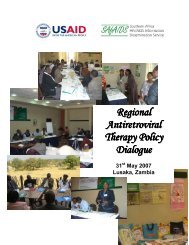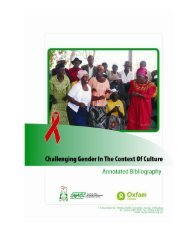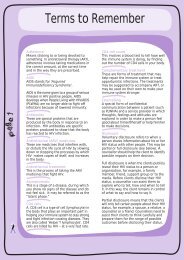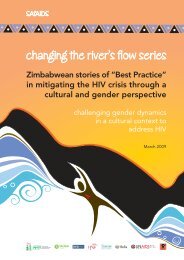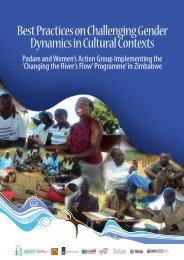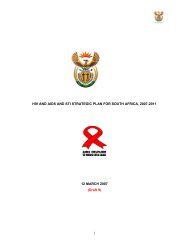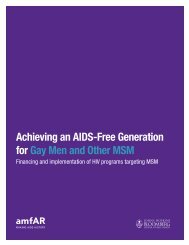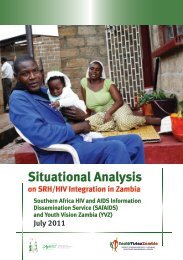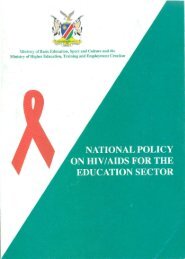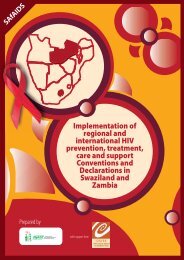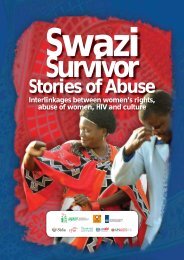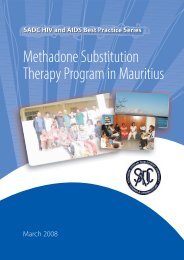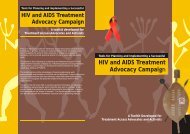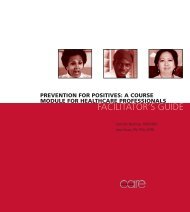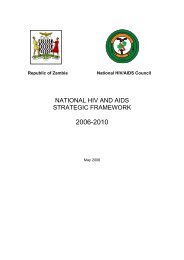A Success Story: The Etafeni Trust Fit for - SAfAIDS
A Success Story: The Etafeni Trust Fit for - SAfAIDS
A Success Story: The Etafeni Trust Fit for - SAfAIDS
Create successful ePaper yourself
Turn your PDF publications into a flip-book with our unique Google optimized e-Paper software.
6.6 Learning Through Reflection and Focus on Sustainability<br />
To ensure that the programme evolves and develops in a constantly responsive<br />
manner, to match dynamics and trends in the community, analysis of the programme<br />
and reflections are done by the <strong>Trust</strong> and programme implementers on a regular<br />
basis. In 2008 an external evaluation was done of the current programme operations,<br />
its success factors as well as key challenges perceived. Data was collected among<br />
three different respondent groups - programme staff, graduate learners and<br />
potential employer companies. Evaluations of the Nyanga, Vrygrond and Nwamitwa<br />
programmes will be conducted again in May and June 2011.<br />
To ensure that consistent learning and reflection is taking place, that it is participatory<br />
and remains conginisant of community needs and trends as they evolve, the <strong>Trust</strong><br />
holds consultative meetings with beneficiaries to reflect on what works or not, and to<br />
suggest what should happen the following year. A strategic workplan is produced in<br />
consultation with stakeholders once a year.<br />
What has contributed to the programme’s sustainability?<br />
• Ownership secured: Ownership of the programme by the Nyanga<br />
community and those who complete the programme is very apparent.<br />
• Partnerships developed: <strong>The</strong> partnerships developed with Departments<br />
of Youth, Health and Labour are crucial to enabling sustained programme<br />
rollout and these links will consistently in<strong>for</strong>m the programme dynamics<br />
to remain abreast with the national direction and directives around SRH,<br />
economic empowerment and youth development.<br />
• Referral system synergies: <strong>The</strong> referral systems and partners made<br />
in the community relating to HIV and other issues further strengthen<br />
the programme, and contribute to success as they link into the broader<br />
continuum of care in the community.<br />
• Multi-skilled staff support to programme: <strong>The</strong> complement of skilled<br />
staff with different skills supports the different elements of the programme<br />
and contributes to its sustainability and effectiveness. Having engaged<br />
technical expertise to guide in key programming areas such as review of<br />
the curriculum of training; monitoring and evaluation systems building;<br />
fund-raising and business network development to consolidate the graduate<br />
placement initiatives allows <strong>for</strong> spaces to reflect and learn on progress<br />
made and how to improve programming approaches.<br />
• Targeted marketing approach: Initially the lack of systematic advertising<br />
of the training programme gradually saw the organisation attracting less<br />
suitable candidates. Following the reflection phase, ef<strong>for</strong>ts were redressed<br />
to attract the most suitable candidates. <strong>Etafeni</strong> produced a brochure which<br />
was placed as an advert in the community newspaper in July 2009. This<br />
improved the quality of potential learners (the questionnaire used to recruit<br />
asks where the candidates heard about the programme) <strong>for</strong> a few months,<br />
be<strong>for</strong>e the same issues arose again.<br />
31



